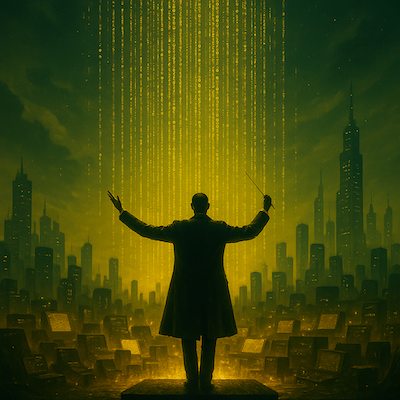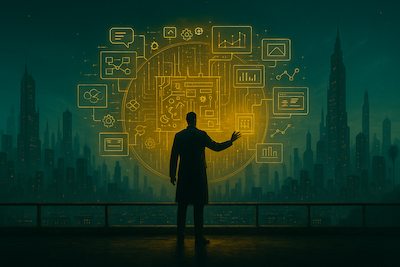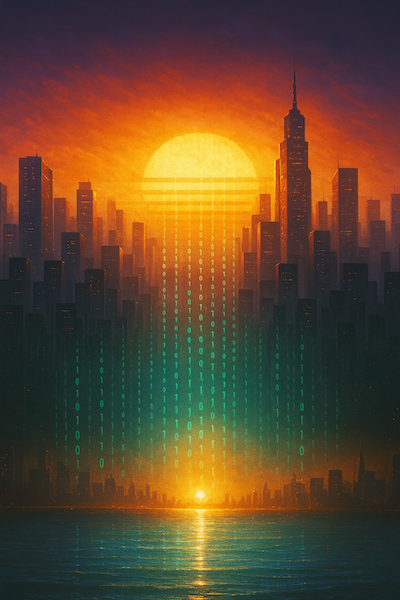
The Future Coder: Less Engineer, More Conductor
There was a time when being a coder meant memorizing every symbol, every command, every library. You typed every line by hand, sweated over semicolons, and built your credibility on how much of the machine you carried in your head. It was an era where technical mastery meant belonging. It is an era that many hold dear.
But it is changing.
For many developers today, that identity is sacred. They spent four, sometimes six years in school, and countless years grinding in industry to get here. They have lived through late nights debugging, endless refactors, and review cycles that seemed to go on forever. To them, the arrival of AI tools such as Codex, Claude, and ChatGPT feels like a betrayal. It is a shortcut that undermines the craft they worked so hard to master.
It is natural that there is frustration. It is natural that there is fear. When something you have built your life around suddenly shifts under your feet, resistance is inevitable.
But culture always resists before it accepts.
Every Shift Feels Like the End
We have seen this movie before. When the internet emerged, there were loud voices against it. Critics called it a fad, a threat, a distraction. When the original smartphones were announced they were dogged by nay-sayers. There will always be nay-sayers, but you may not remember.
You do not remember those voices because they disappeared.
Every cultural shift feels like an apocalypse to those who built their identity on the old way. But those who adopt, who adapt, and who learn the rhythm of the new, become the ones remembered.
That is where we are now with coding. We are in the uproar phase. A cultural breaking point.
The Rise of the AI Collaborator
At this moment, AI is imperfect. It forgets, stumbles, and occasionally drifts off course. Yet it is improving at a pace that is impossible to ignore. However, these models will only become sharper, faster, and more reliable.
The shift is undeniable. Coders of tomorrow will not be measured by how quickly they can produce boilerplate code. They will be measured by how clearly they can guide AI, how creatively they can shape workflows, and how effectively they can bring harmony out of the chaos of humans, machines, and systems.
The coder of the future is less an engineer hammering every nail and more a conductor leading an orchestra.
The Role of the Conductor
Think of a symphony. The conductor does not play the violin. They do not pound the drums. They do not produce every note. What they do is guide. They set the tempo, hold the vision, and keep the musicians in flow. Beethoven’s 9th for example, incredible.
That is the coder’s new role. They will not be defined by obscure syntax trivia or by how fast they can type. They will be defined by adaptability, clarity, and imagination. They will know how to speak to both humans and machines.
In this new role, vibe coding, or at the very least AI assisted coding, is not a side experiment. It is the future.
Why the Uproar Matters
The uproar is proof that the shift is real. It is what always happens when something massive changes. Professionals cry foul, communities split, and lines are drawn. The old guard insists that the new tools are cheating. Over time, those voices fade, and what once felt disruptive becomes the new normal.
In the nineties, academics dismissed the internet as unserious. In the early 2000s, writers mocked blogs as amateurish and cheap. In high school for me, teachers would not allow me to cite Wikipedia. Today, those same voices could not imagine a world without them.
Coders are now in the same storm. Storms pass. And when they do, the people who learned how to move with the wind are the ones left standing.
Early Adopters, Early Rewards
The coders who lean into AI today, who practice with it, who make mistakes, and who learn how to guide it, are planting seeds for the new era. They will be fluent in this new language while others are still arguing about whether it should exist at all. Truth.
Early adopters always see the rewards. Not because they are smarter, but because they are willing to see what others cannot. They are willing to play with the tools while the skeptics hold back. They are willing to let go of the comfort of being an engineer and step into the uncertainty of being a conductor.
The Future is Flow
The coder of the future is not hunched over every line of syntax. They are standing before an orchestra of tools, humans, and AI systems, guiding them into harmony. They do not need to play every instrument, because they understand how to bring them together.
Yes, some will call it cheating. Yes, some will dismiss it. Yes, there will be resistance. But the cultural tide is already moving, and it will not turn back.
I wonder if Beethoven felt such scrutiny?
The coder of the future is less about control and more about flow. Less about memorizing commands, more about conducting vision. The coder of the future is here, and they are here now. The coder evolves.
The code abides. B



